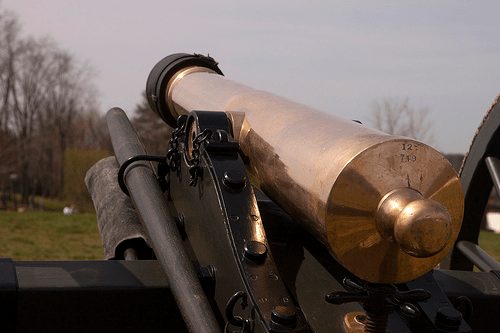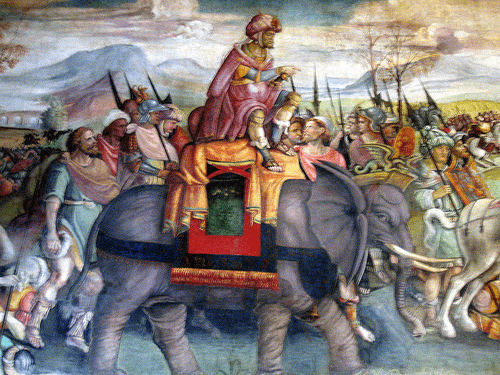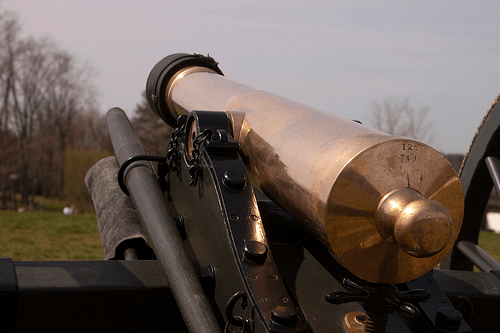Campaigns, tactics, strategy – sometimes it’s hard to know whether we’re talking about marketing and war. And sometimes, it really is a fine line. We’re constantly fighting competitors and noise for our target audience’s attention.
It’s not surprising that marketers can learn a lot about strategy from history’s greatest battles.
George Santayana (not Winston Churchill as many believe) said: “Those who cannot remember the past are condemned to repeat it.”
With these words of wisdom, we bring you marketing wisdom from history’s greatest battles:
1. The Battle of Zama
We all know that Hannibal crossed the Alps and was one of the greatest military commanders in history, but here’s the thing. Even he made mistakes.
At the Battle of Zama around 206 BC, he suffered a humiliating and decisive defeat. He had planned to scatter his Roman opponents by terrifying them with elephants. The trouble is, you can’t hide an elephant. That meant the Romans knew he was up to something and were able to turn those elephants against Hannibal’s own forces with some well-timed noise. The result? Hannibal lost the battle and the war.

Image: Anthony Majanlahti
Marketing lesson: Never assume. You need to form opinions by testing. If your strategy relies on assumptions about how people will behave, you’ll probably fail. Use analytics tools to map out your play-by-play.
2. The Battle of Marathon
The Battle of Marathon in 490 BC turned the tide of the Greek-Persian war. The Persians had invaded Greece and were well equipped in terms of cavalry and weapons. In contrast, the Greeks just had swords and javelins and had to fight on foot.
It looked like it would be a one-sided battle, with the Greeks on the losing side. So how did they win? They evened the odds by waiting till the Persian cavalry was away to do battle. The result was panic, confusion, slaughter and the eventual end of the Persian invasion.
Marketing lesson: Even if you are smaller than your competitor, by optimizing the tools you have and competing when you have an advantage, can lead to success.
The Battle of Marathon is also famous for giving its name to an Olympic event. That’s because after the battle was won, a messenger ran the 26 miles from Marathon to Athens to share the good news, only to die after he’d delivered it.
Marketing lesson: Delivering your message takes commitment and consistency. If you don’t deliver a consistent message on a regular basis, you won’t get the results you want in terms of recognition and authority.
3. The American War of Independence
Does the biggest, most talented guy always win? Not necessarily. More often than not, success is about knowing what to do with the resources you have.
George Washington led the country to independence not because he was the greatest fighter, but because he was a great organizer.
That meant that he was able to put the right people in the right places and motivate them to lead to decisive changes in the run of battles, eventually routing the British once and for all.
Marketing lesson: Tools can help you run a great campaign and achieve your desired KPIs and ROI. Be organized. Know your plan of attack. Streamline your resources into a cohesive strategy.
4. The Battle of Guadalcanal
The Battle of Guadalcanal, fought between 1942 and 1943, paved the way for the US to win the South Pacific in World War II. To achieve success, American and Allied forces fought the battle on land, sea and air.
Marketing lesson: Marketers must take their campaigns to where their customers are. That means creating multi-channel marketing strategies, leveraging online and offline marketing and multiple types of promotion, including social media, guest posting, PPC, and more.
5. The Battle of Gettysburg
The Battle of Gettysburg took place in July 1863. The defeat of the Confederates after the three-day battle at this strategic crossroads town is seen by many as the turning point in the Civil War.
The key to success? The Union General Meade found a window of opportunity. He leveraged geography to gain a strategic defensive advantage over the approaching Confederate army.
What would have happened if Meade hadn’t recognized that this was a great location to make a stand? The Union might have suffered another defeat, allowing the Confederates into the northern states where they could resupply, and potentially win the war. American history would have pulled a complete 180.

Image: Emily Mitchell/Bella Remy Photography
Marketing lesson: Choosing the right place for the battle – such as the gaps where no one is active – can give you a strategic advantage.
6. The Spanish Armada
The Spanish Armada made multiple attempts to invade England from the late 16th century onwards, but it never succeeded.
With the number of ships and arms they had, the Spanish should have been successful, but they kept losing to a combination of a resilient British navy and poor weather conditions.
Over the years, the British adapted their strategy, keeping the Spanish permanently at bay.
 Image: CircaSassy
Image: CircaSassy
Marketing lesson: Don’t stick blindly to a strategy that’s not working; remain nimble and be prepared to adapt as things change.
7. The Trojan War
Scholars are still arguing about whether this war had any historical basis or was completely invented by Virgil in the Aeneid. Regardless of historical fact, the story of how the Greeks entered Troy by hiding in a wooden horse to win the Trojan War still holds a valuable lesson for marketers.
In order to carry out an extremely intricate plan of attack, the Greeks had to identify an item that was likely to appeal to their opponents, construct it and market it (by letting someone tell the Greeks the horse was a gift for them). They used stealth and waited for the perfect moment to emerge.
Marketing lesson: Identifying what your customers want will help you achieve marketing success. And guerrilla marketing (using unconventional methods) can improve your results.
Finally, here’s a footnote – every good marketing campaign starts with research.
Final Thoughts: Attacking Blindly Isn’t the Answer
What these battles share in common is intricate planning. Military leaders started with a target goal and reversed engineered their tactics. Don’t throw darts in the dark. A carefully planned strategy, built around key areas of opportunity, will carry you far.
Featured Image Credit: Frank Pierson via Flickr


